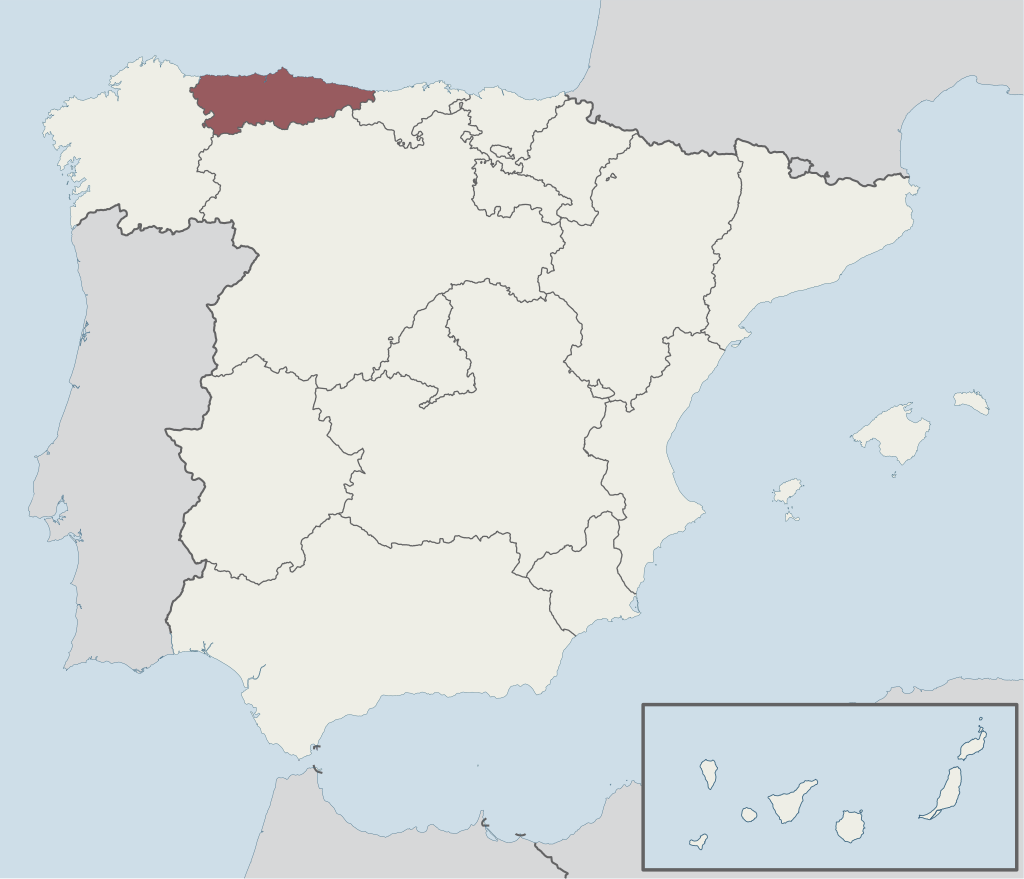Asturias boasts diverse landscapes, with the Cantabrian Mountains bordering the province to the south. The Picos de Europa National Park, with peaks rising to 2,648 meters, offers opportunities for activities like climbing and skiing. The coastline is adorned with numerous beaches, coves, and sea caves, such as the Playa del Silencio and those near Llanes. The region’s climate, influenced by the Gulf Stream, brings high precipitation and mild temperatures, making it lush and green year-round. Winters see snow in the mountains, while coastal areas enjoy relatively mild conditions.

Asturias, with a population of 1,018,784, represents 2.1% of Spain’s population, with 96 people per square kilometer. It has the highest mortality rate and lowest fertility rate in Spain as well as the lowest in the EU. Immigration accounts for only 3.65% of the population. While Spanish is the official language, Asturian, also known as Bable, is protected by law and spoken in the region. Eonavian is spoken in western Asturias, with ongoing efforts to establish place names in both dialects.
For centuries, agriculture, fishing, and dairy production were the most dominant in Asturias’s economy. Milk production in particular, saw significant growth in the late 1960s, with products from Central Lechera Asturiana now sold nationwide. Historically, coal mining and steel production were key industries, driving migration from other Spanish regions. However, both sectors have declined due to high production costs and competition. While Asturias’s economic growth lags behind Spain’s overall rate, service industries have seen growth, reducing unemployment in the region and EU investments since 1986 has improved infrastructure. In 2018, Asturias’s GDP was €23.3 billion, accounting for 1.9% of Spain’s output. Despite its decline since the mining industry’s peak, Asturias remains among Spain’s wealthier regions, with below-average unemployment at 13.7% in 2017.

ASINCAR is a Gold-labeled Agrifood Technology Centre and Business Cluster, representing over 95 companies, primarily SMEs, across the entire value chain. The center's core mission is to enhance the competitiveness and sustainability of Agrifood companies by fostering innovation, cooperation, knowledge transfer, and training to adapt to evolving market scenarios. ASINCAR focuses on diverse activities, including Research, Development, and Innovation projects covering areas such as novel food products, preservation technologies, biotechnology for food safety, and Industry 4.0. Additionally, it engages in cluster activities, networking, internationalization, operates a Food pilot plant, conducts food laboratory analyses, and provides technical consulting services related to safety, quality, and standards. Vocational training programs are also offered for both employed and unemployed individuals.

CTIC Technology Centre is a non-profit Research and Technology Organization focused on cutting-edge technologies. With over 60 specialists, including engineers and PhD researchers, CTIC specializes in Information and Communication Technologies (ICT). Their goals include advancing ICT development, enhancing business competitiveness through applied research, and disseminating Science and Technology. CTIC's expertise lies in enabling technologies for digital transformation, such as Web of Things, Artificial Intelligence, Big Data, Standardization, Open Data, Vision Technologies, and Blockchain. The center actively collaborates with national and international research groups, supporting innovative projects and facilitating knowledge transfer between research institutions, industry, and public administrations. CTIC is the World Wide Web Consortium (W3C) Chapter for Spain and the Latin-American Spanish-speaking regions. The organization contributes to the intelligent development of territories, enhances business competitiveness through innovation, and aims to improve people's quality of life.

Grupo DEX (Desarrollo de Estrategias Exteriores, S.A) is an international consultancy firm dedicated to providing specialised services on European affairs, strategic planning, innovation, local development and advice on international economic and institutional relations to companies and public administration. With a flexible and highly competitive structure, DEX has a multidisciplinary team of experts with experience in Economics, Law and International Relations, Engineering and a deep knowledge of the activity of the European Union and its aid programmes.

The Asturian Rural Development Network consists of eleven Local Action Groups overseeing LEADER funds in Asturias, a coastal and mountainous region in northern Spain. With 80% of rural territory and one million inhabitants, the focus is on 71 out of 78 municipalities in Asturias, investing 25% of our RDP (Rural Development Programme) in LEADER. A key initiative, Ticket Rural, supports rural self-entrepreneurship, providing 30,000 euros over three years. This pioneering measure, especially popular among women entrepreneurs, aims to diversify and revitalize Asturian rural areas, allocating a total of 111 million euros from 2014-2020, with an annual commitment of 18 million euros until 2029.

This project has received funding from the European Union’s Horizon Europe research and innovation program under grant agreement no 101060876. UK participants in Horizon Europe Project RURALITIES are supported by UKRI grant numbers: 10051963 The Highlands and Islands Transport Partnership and 10050988 Earthwatch Europe.
